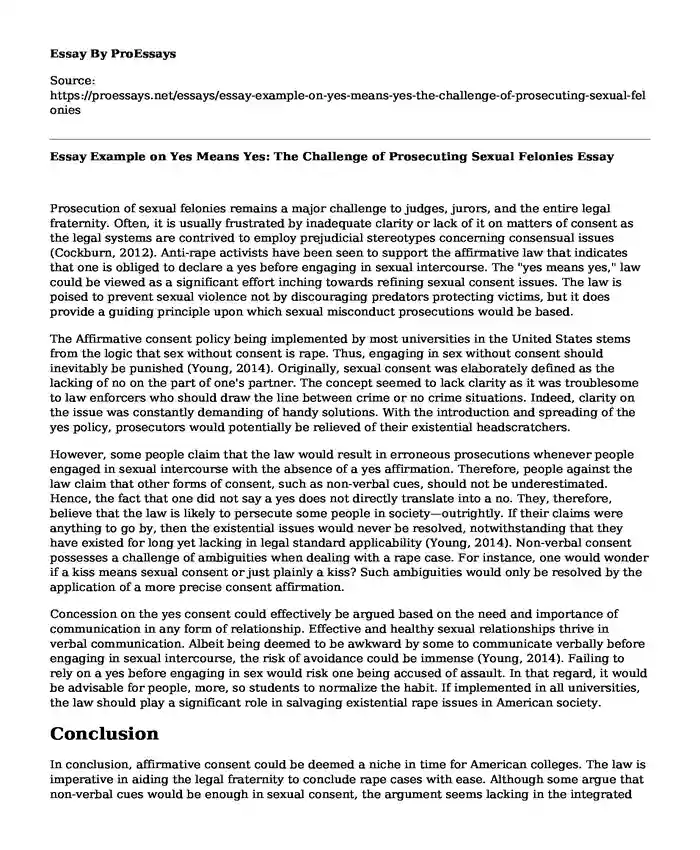Prosecution of sexual felonies remains a major challenge to judges, jurors, and the entire legal fraternity. Often, it is usually frustrated by inadequate clarity or lack of it on matters of consent as the legal systems are contrived to employ prejudicial stereotypes concerning consensual issues (Cockburn, 2012). Anti-rape activists have been seen to support the affirmative law that indicates that one is obliged to declare a yes before engaging in sexual intercourse. The "yes means yes," law could be viewed as a significant effort inching towards refining sexual consent issues. The law is poised to prevent sexual violence not by discouraging predators protecting victims, but it does provide a guiding principle upon which sexual misconduct prosecutions would be based.
The Affirmative consent policy being implemented by most universities in the United States stems from the logic that sex without consent is rape. Thus, engaging in sex without consent should inevitably be punished (Young, 2014). Originally, sexual consent was elaborately defined as the lacking of no on the part of one's partner. The concept seemed to lack clarity as it was troublesome to law enforcers who should draw the line between crime or no crime situations. Indeed, clarity on the issue was constantly demanding of handy solutions. With the introduction and spreading of the yes policy, prosecutors would potentially be relieved of their existential headscratchers.
However, some people claim that the law would result in erroneous prosecutions whenever people engaged in sexual intercourse with the absence of a yes affirmation. Therefore, people against the law claim that other forms of consent, such as non-verbal cues, should not be underestimated. Hence, the fact that one did not say a yes does not directly translate into a no. They, therefore, believe that the law is likely to persecute some people in society—outrightly. If their claims were anything to go by, then the existential issues would never be resolved, notwithstanding that they have existed for long yet lacking in legal standard applicability (Young, 2014). Non-verbal consent possesses a challenge of ambiguities when dealing with a rape case. For instance, one would wonder if a kiss means sexual consent or just plainly a kiss? Such ambiguities would only be resolved by the application of a more precise consent affirmation.
Concession on the yes consent could effectively be argued based on the need and importance of communication in any form of relationship. Effective and healthy sexual relationships thrive in verbal communication. Albeit being deemed to be awkward by some to communicate verbally before engaging in sexual intercourse, the risk of avoidance could be immense (Young, 2014). Failing to rely on a yes before engaging in sex would risk one being accused of assault. In that regard, it would be advisable for people, more, so students to normalize the habit. If implemented in all universities, the law should play a significant role in salvaging existential rape issues in American society.
Conclusion
In conclusion, affirmative consent could be deemed a niche in time for American colleges. The law is imperative in aiding the legal fraternity to conclude rape cases with ease. Although some argue that non-verbal cues would be enough in sexual consent, the argument seems lacking in the integrated solution of the core problem. Non-verbal cues, without a doubt, are filled with immense ambiguity, which makes them unreliable in the legal framework. The awkwardness claimed to surround verbal communication could be deemed minute compared to the repercussions one would face were the law to be utilized in every rape case. The law would provide a better platform for dealing with rape cases.
References
Cockburn, H. (2012). The Impact of Introducing an Affirmative Model of Consent and Changes to the Defense of Mistake in Tasmanian Rape Trials. https://eprints.utas.edu.au/14748/2/whole-cockburn-thesis.pdf
Young, C. (2014, August 29). Affirmative Consent in California: The Problem With 'Yes Means Yes.' Retrieved July 03, 2020, from https://time.com/3222176/campus-rape-the-problem-with-yes-means-yes/
Cite this page
Essay Example on Yes Means Yes: The Challenge of Prosecuting Sexual Felonies. (2023, Sep 23). Retrieved from https://proessays.net/essays/essay-example-on-yes-means-yes-the-challenge-of-prosecuting-sexual-felonies
If you are the original author of this essay and no longer wish to have it published on the ProEssays website, please click below to request its removal:
- Paper Example on Economic Inequality in Cambodia
- What Persuasive Strategies Make the Fake News Seem to Be True? - Paper Example
- The Migrant Caravan From Honduras Essay Example
- Income Inequality: The Unequal Gap Between Races - Essay Sample
- Estelle v Gamble: Misdiagnosis of Inmates & Its Implications - Essay Sample
- Immigration Officer: A Rewarding Career Path for Students - Essay Sample
- Essay Example on Bullying: Power Dynamics & Its Impact on Society







